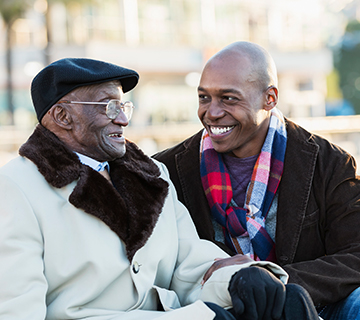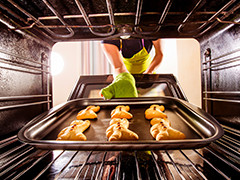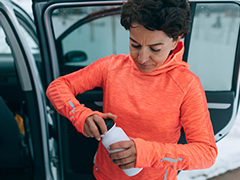Winter Safety Tips for Seniors

When it comes to the cold, seniors are at higher risk of health problems and weather-related injuries. But there are ways to protect yourself from falling victim to these issues. See how you can avoid a few major issues and protect your health during the winter months.
Shoveling
Take necessary precautions if you plan on shoveling snow yourself. This kind of strenuous activity can cause lower back pain if done incorrectly. Always stretch to loosen up beforehand, and if the workload gets to be too much, ask a neighbor or relative to help out. Do not attempt to shovel if you’re already suffering from lower back pain. Check out these remedies instead.
Always talk to your doctor before you start a new exercise routine.
Hypothermia
Hypothermia occurs when your body loses heat faster than it can produce it, causing dangerously low body temperatures. As we get older, our bodies go through changes and lose certain abilities that we rely on in our younger years. For example, seniors often shiver less or not at all as their body temperatures drop. Because of this, it’s important to look out for other warning signs of hypothermia, like cold, pale or ashy skin, increased fatigue, problems walking and slowed breathing or heart rate.
Take the following precautions to avoid hypothermia: stay indoors, keep dry, and when you do go outside, wear 2 to 3 inner layers of clothing under your outer layers: hat, gloves, winter coat, and boots at a minimum.
Frostbite
Frostbite occurs when your skin and the tissues beneath it freeze. We are most prone to frostbite in the areas farthest from the heart, like our fingertips and toes. Other common areas include your nose, ears, cheeks and chin. Seniors with heart disease and other blood problems are at a much higher risk. The warning signs of frostbite include white, ashy or grayish-yellow skin, hard or waxy skin and numbness.
To avoid frostbite, keep all parts of your body covered outdoors. If you know you’ll be outside for a longer period of time, make sure to bring a scarf or mask to cover your face.
Falling
Falling is as unpredictable as it is common. The best advice is to be extra cautious of where you are walking outdoors. Avoid black ice or wet pavement, make sure steps and walkways are clear, plow and salt common outdoor footpaths at home (or have someone do it for you) and wear boots with non-skid soles.
Accidents While Driving
Accidents involving seniors rise in the winter due to inclement weather and poor road conditions. Again, accidents are unpredictable, but there are things you can do to lower the risk. First, prepare your car for winter weather. That means checking the antifreeze, tire pressure and treads and windshield wipers. Next, stock your car with emergency supplies and always keep your phone on you. It’s always good to have a first aid kit, blanket, scraper tool and jumper cables just in case. Finally, avoid icy and unplowed roads. Bigger roads are usually better maintained than small roads, so plan your safest route.


